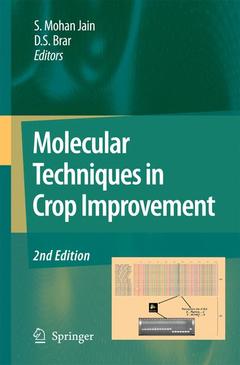Description
Molecular Techniques in Crop Improvement (2nd Ed., 2nd ed. 2009)
2nd Edition
Coordinators: Jain Shri Mohan, Brar D.S.
Language: English
Subjects for Molecular Techniques in Crop Improvement:
Keywords
Fruit; Mutation; Seed; biotechnology; breeding; crop plants; crops; genetic engineering; genetics; plant breeding; quality; recombination; wheat
Molecular Techniques in Crop Improvement (2nd Ed.)
Publication date: 11-2014
772 p. · 15.5x23.5 cm · Paperback
Publication date: 11-2014
772 p. · 15.5x23.5 cm · Paperback
Molecular techniques in crop improvement (2nd Ed.)
Publication date: 03-2010
772 p. · 15.5x23.5 cm · Hardback
Publication date: 03-2010
772 p. · 15.5x23.5 cm · Hardback
Description
/li>Contents
/li>Comment
/li>
Most of the plant breeding programs aim to increase yield, disease and insect resistance, abiotic stress tolerance and to improve quality characteristics. The value of new plant breeding products and varieties in increasing food production has been demonstrated time and again. To meet growing need of ever increasing human population, we need to enhance food production for sustaining food supply. Furthermore, several biotic and abiotic stresses continue to threaten crop product- ity. Moreover with urbanization, land for cultivation is shrinking and several en- ronment concerns involving excessive use of fertilizers and agro-chemicals, soil and water pollution including water scarcity are key issues in increasing crop p- ductivity and food sustainability. Plant breeders therefore, has the major challenge how to increase crop productivity with limited land, limited water, limited che- cals and limited labour particularly in the context of global climate changes. In the genomics era, advances in molecular biology have opened new opportunities to accelerate plant breeding processes and in overcoming some of the above c- straints limiting crop productivity. Molecular markers have become important tools in the hands of plant breeders in marker assisted breeding and for enhancing the selection efficiency for various agronomic traits in precision ?plant? breeding.
Plant Breeding in the genomics era.- QTL Analysis in Plant Breeding.- Comparative Genomics in Crop Plants.- Functional Genomics For Crop Improvement.- Bioinformatics Tools for Crop Research and Breeding.- Molecular markers and their application.- Gene-Based Marker Systems in Plants: High Throughput Approaches for Marker Discovery and Genotyping.- Automation of DNA Marker Analysis for Molecular Breeding in Crops.- Pyramiding Genes for Enhancing Tolerance to Abiotic and Biotic Stresses.- Application of Molecular Markers for Breeding Disease Resistant Varieties in Crop Plants.- Molecular Markers Based Approaches for Drought Tolerance.- Molecular Markers for Characterizing and Conserving Crop Plant Germplasm.- Genomics.- Rice Genomics.- Genomics for Wheat Improvement.- TILLING for Mutations in Model Plants and Crops.- Microarray Analysis for Studying the Abiotic Stress Responses in Plants.- Roles of MicroRNAs in Plant Abiotic Stress.- Molecular Tools for Enhancing Salinity Tolerance in Plants.- DNA Microarray as Part of a Genomic-Assisted Breeding Approach.- Unravelling Gene Function Through Mutagenesis.- Techniques in Plant Proteomics.- Metabolomics: Novel Tool for Studying Complex Biological Systems.- Transcriptomic Analysis of Multiple Enviornmental Stresses in Plants.- Transgenic Technologies.- Marker-Free Targeted Transformation.- Promoter Trapping in Plants Using T-DNA Mutagenesis.- Plant Genome Engineering Using Zinc Finger Nucleases.- Cisgenesis.- Gene Stacking.- Gene Silencing.- Plant RNAi and Crop Improvement.- Metabolomics in Fruit Development.- Genetic Engineering in Floriculture.- Transgenesis and Genomics in Forage Crops.
Deals with molecular tools in plant breeding, molecular marker assisted breeding, gene silencing, functional genomics and genetic engineering
© 2024 LAVOISIER S.A.S.




